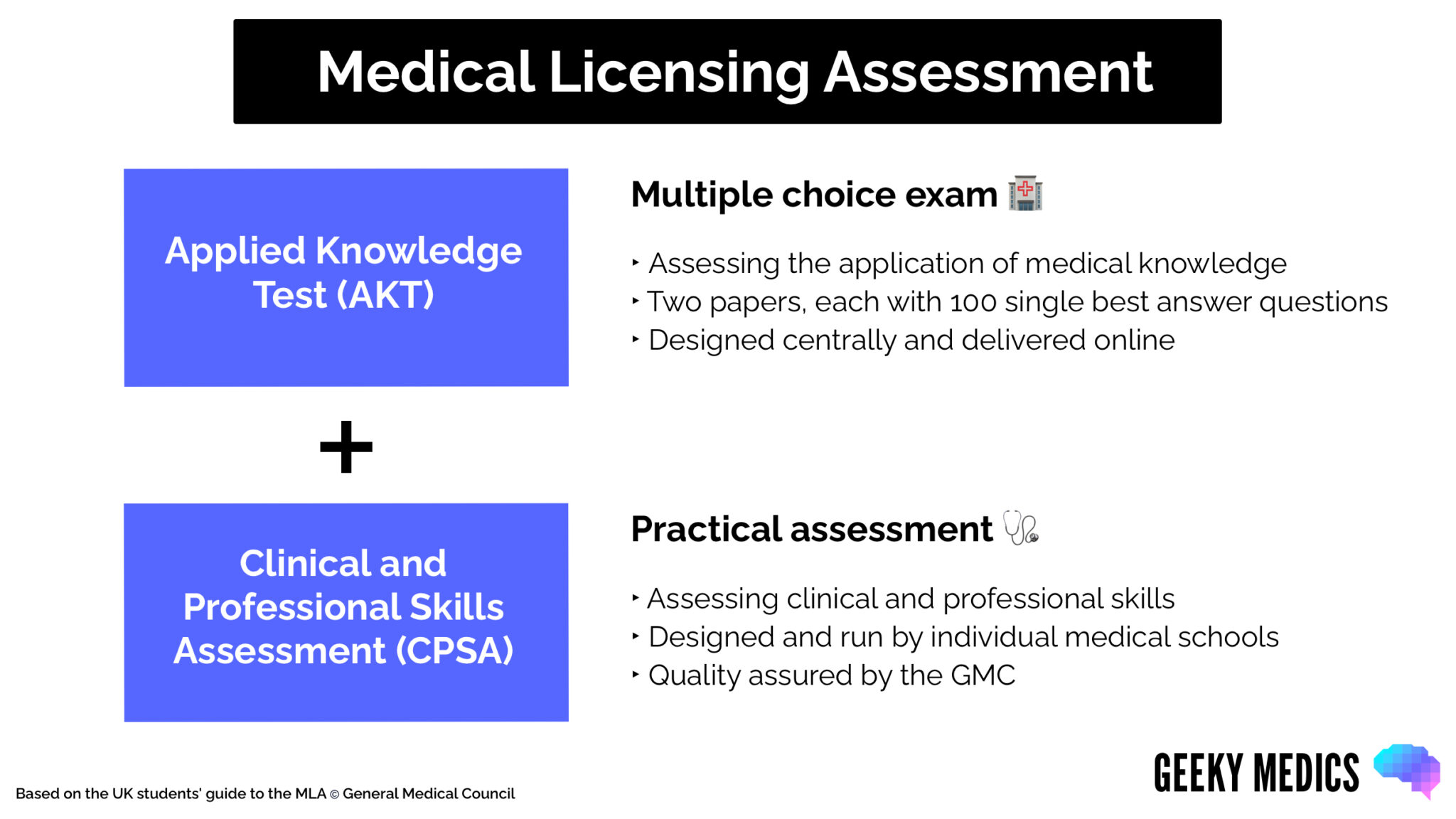- 📖 Geeky Medics OSCE Book
- ⚡ Geeky Medics Bundles
- ✨ 1300+ OSCE Stations
- ✅ OSCE Checklist PDF Booklet
- 🧠 UKMLA AKT Question Bank
- 💊 PSA Question Bank
- 💉 Clinical Skills App
- 🗂️ Flashcard Collections | OSCE, Medicine, Surgery, Anatomy
- 💬 SCA Cases for MRCGP
To be the first to know about our latest videos subscribe to our YouTube channel 🙌
The Clinical and Professional Assessment (CPSA) is a practical exam taken as part of the UK Medical Licensing Assessment (MLA).
If you graduate from a UK medical school in the academic year 2024-25 or later, you must pass the CPSA before joining the medical register.
You will also need to pass the Applied Knowledge Test (AKT), the theoretical/knowledge component of the MLA.
This article will discuss the Clinical and Professional Skills Assessment (CPSA), including how to prepare for the CPSA.
PLAB 2 / international medical graduates
For international medical graduates, the Professional and Linguistic Assessments Board (PLAB) exams will continue (PLAB 1 and PLAB 2).
The GMC has announced that all PLAB 2 exams on or after 17th May 2024 will be based on the UKMLA content map.
PLAB 2 will meet the requirements of the UKMLA Clinical and Professional Skills Assessment (CPSA)
What is the CPSA?
The CPSA is a practical, performance-based assessment of your clinical skills and professionalism.
The format of the CPSA will vary between medical schools. Unlike the AKT, there is no single set format for the CPSA. Medical schools can use a variety of practical examination formats, including:
- Objective Structured Clinical Examination (OSCE)
- Objective Structured Long Examination Record (OSLER)
- Practical Assessment of Clinical Examination Skills (PACES)
Medical schools will be responsible for designing and delivering the CPSA. There is no single national examination like the AKT. There will be variability between medical schools in how they design and deliver the exam.
However, the General Medical Council (GMC) will ensure quality and validate the CPSA. Medical schools must submit their CPSA plans to the GMC, and the GMC must approve these.
AKT vs CPSA
The AKT is being designed nationally. This means individual medical schools will not control the format or content of the AKT their students are taking.
This is in contrast to the CPSA, which is designed and delivered by your medical school (but it must meet the GMC’s requirements).
How do I know the format of the CPSA?
You’ll need to contact your medical school regarding their arrangements for the CPSA. They should inform you of the structure and format of the examination.
Most medical schools will likely adapt their existing “finals OSCEs” for the CPSA.
Which stations could appear in the CPSA?
The MLA content map sets out the content which could be tested as part of the MLA (both the AKT and the CPSA).
There are three overarching themes in the MLA content map:
- Readiness for safe practice
- Managing uncertainty
- Delivering person-centred care
The MLA content map contains a list of patient presentations and conditions which could appear in your medical school’s CPSA. In addition, there is a list of practical skills/procedures and areas of professional knowledge.
Each station in the CPSA will be blueprinted to the MLA content map – this means each station must be mapped to items in the content map.
The conditions and presentations in the MLA content map are divided into 24 areas of clinical practice. Some presentations and conditions occur in multiple areas of clinical practice.
We’ve produced an OSCE revision checklist, which lists the common stations appearing in medical school OSCEs.
Preparing for the CPSA
Find out the exam format
UK medical students
For UK medical students, remember your medical school will be designing and delivering the CPSA. They will have submitted their plans to the GMC for approval.
Ask your medical school for information on the format of the CPSA. They should provide information on the exam format and structure.
PLAB / international medical graduates
For international medical graduates taking the PLAB 2 exam, the GMC has announced that all tests on or after 17th May 2024 will be based on the UK MLA content map.
You should refer to the GMC PLAB 2 pages for information on the PLAB 2 exam format.
Use the MLA content map
You must be familiar with the MLA content map to revise for the CPSA (and AKT). Medical schools should align their curriculums with the content map to ensure each condition and presentation is covered throughout the course.
Practical procedures
Knowing practical skills and procedures is important before taking the CPSA. The General Medical Council outline the practical skills they expect newly qualified doctors to be able to perform in Outcomes for Graduates (practical skills and procedures).
These procedures are split into categories:
- Patient assessment
- Diagnostic procedures
- Patient care
- Prescribing
- Therapeutic procedures
For more information, see our list of MLA practical skills with links to relevant Geeky Medics OSCE guides.
Conditions
The MLA content map contains a list of 311 conditions (e.g. acute glaucoma, leukaemia), which could appear as a question in the AKT.
For more information, see our list of MLA conditions with links to relevant Geeky Medics articles.
Presentations
The MLA content map contains a list of 212 patient presentations (e.g. back pain, fatigue), which could appear as a question in the AKT.
For more information, see our list of MLA patient presentations with links to relevant Geeky Medics articles.
Areas of professional knowledge
The MLA content map also includes 12 areas of professional knowledge:
- Allergy and immunology
- Biomedical sciences
- Clinical biochemistry
- Clinical pharmacology and therapeutics
- Genetics and genomics
- Histopathology
- Human factors and quality improvement
- Laboratory haematology
- Medical ethics and law
- Microbiology
- Psychological principles
- Social and population health
Some CPSA scenarios may align with these professional knowledge areas. For example, there could be stations on medical ethics or interpretation of statistics.
Use our free OSCE guides
The CPSA is a practical examination where you must perform skills or procedures. Although the exact exam format will vary between medical schools, our free OSCE guides cover the key steps for common types of stations and scenarios:
- Clinical examination
- Communication skills
- Procedures
- Data interpretation
- ABCDE / simulation scenarios
- Prescribing
- Documentation
Practice, practice, practice
Practising skills or procedures is key to preparing for the CPSA. Your medical school may provide facilities for you to practise clinical procedures (e.g. intravenous cannulation), and you should also take advantage of opportunities to see patients and refine your examination technique when on clinical placement.
Our free OSCE station creator tool enables you to create practice OSCE stations and share these with your friends and study partners. We also have a bank of over 1,000 ready-made OSCE stations.
Tips for passing the CPSA
Here are some final tips for passing your CPSA.
- Look after yourself: remember this is a practical exam assessing your performance, so you must give yourself the best opportunity to perform well. Sleep, exercise and eat healthily leading up to the CPSA.
- Dress appropriately: try to look smart and follow local dress code regulations.
- Remember the basics: introduce yourself, don adequate PPE and wash your hands – these are simple things that can be easily forgotten during the stress of a practical exam.
- Forget any bad stations/scenarios: the CPSA will have multiple stations, and the examiners will not communicate between themselves during the stations. Therefore, if you have a bad station, try to move on and focus on the next station – the examiner watching you doesn’t know what happened in a previous station!
Resources for the CPSA
- Geeky Medics OSCE Stations Bank (1000+ stations)
- Geeky Medics OSCE Revision Guide
- Geeky Medics OSCE Flashcards (3000 flashcards)
- List of MLA conditions mapped to Geeky Medics articles
- List of MLA presentations mapped to Geeky Medics articles
- GMC Medical Licensing Assessment content map
References
- General Medical Council. Medical Licensing Assessment. Available from: [LINK]
- General Medical Council. MLA Content Map. Available from: [LINK]
- General Medical Council. Requirements for the MLA Clinical and Professional Skills Assessment. Available from: [LINK]





